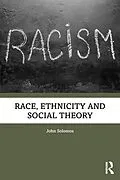Race, Ethnicity and Social Theory provides a critical analysis of the main areas of scholarly research and debate about racial and ethnic relations over the past few decades. The book covers substantive areas of scholarly debate in this fast-changing field, including race and social relations, identities and the construction of the racial other, feminism and race, the relationship between race and nationalism, antisemitism, the evolution of new forms of racism, race and political representation and, more generally, the changing debates about race and ethnicity in our global environment.
The book argues that there is a need for more dialogue across national and conceptual boundaries about how to develop the theoretical tools needed to understand both the historical roots of contemporary forms of racialised social and political relations and the contemporary forms through which race is made and re-made. A key argument that runs through the book is the need to develop conceptual frameworks that can help us to make sense of the changing forms of racial and ethnic relations in contemporary societies. This means developing more dialogue across national research cultures as well as empirical research that seeks to engage with the key issues raised by contemporary theoretical debates.
The book will be of interest to both students wanting to develop a deeper understanding of this area of scholarship and to researchers of race, ethnicity and migration working in various national and disciplinary environments.
Autorentext
John Solomos is Professor of Sociology at the University of Warwick, UK. He has researched and written widely on the history and contemporary forms of race and ethnic relations in Britain, theories of race and racism, the politics of race, equal opportunity policies, multiculturalism and social policy, race and football, and racist movements and ideas. His most recent books are Race and Racism in Britain (Fourth Edition, Palgrave Macmillan, 2022) and The Unfinished Politics of Race: Histories of Political Participation, Migration and Multiculturalism (Cambridge University Press (2022). His most recent edited books are Race and Ethnicity in Pandemic Times (Routledge, 2022), An Introduction to Sociology (SAGE, 2022), Theories of Race and Racism: A Reader (Third Edition, Routledge, 2022) and Routledge International Handbook of Contemporary Racisms (Routledge, 2020). He is also Editor-in-Chief of the Ethnic and Racial Studies journal, co-editor of the Racism, Resistance and Social Change book series (Manchester University Press) and General Editor of the online The Routledge Encyclopaedia of Race and Racism series.
Klappentext
Race, Ethnicity and Social Theory provides a critical analysis of the main areas of scholarly research and debate about racial and ethnic relations over the past few decades. The book covers substantive areas of scholarly debate in this fast-changing field, including race and social relations, identities and the construction of the racial other, feminism and race, the relationship between race and nationalism, antisemitism, the evolution of new forms of racism, race and political representation and, more generally, the changing debates about race and ethnicity in our global environment.
The book argues that there is a need for more dialogue across national and conceptual boundaries about how to develop the theoretical tools needed to understand both the historical roots of contemporary forms of racialised social and political relations and the contemporary forms through which race is made and re-made. A key argument that runs through the book is that the need to develop conceptual frameworks that can help us to make sense of the changing forms of racial and ethnic relations in contemporary societies. This means developing more dialogue across national research cultures as well as empirical research that seeks to engage with the key issues raised by contemporary theoretical debates.
The book will be of interest to both students wanting to develop a deeper understanding of this area of scholarship and to researchers of race, ethnicity and migration working in various national and disciplinary environments.
Inhalt
Preface
Introduction
Origins and trajectories
Political and policy context
Situating this book
Race relations and social theory
Structuring the argument
1. Theoretical Frameworks and Perspectives
Concepts and analytical frames
Sociologies of race in Britain
Sociological perspectives in America
Critical and interdisciplinary theories
Globalisation of scholarship and research
Postcolonial and decolonial perspectives on race
Rethinking the boundaries of race and ethnicity
2. Race and Social Relations
Race, social relations, and class
Genesis and development
From race to class, and back again
Reconceptualising racism and social relations
Racism and society
Locating race and ethnicity in the social world
3. Constructing Identities and the Racial Other
Identities, boundaries, and racialisation
Culture, identity, race
Whiteness and the racial other
Intersectional approaches to race and ethnicity
Living with difference
4. Reframing Feminism, Rethinking Race
Race and feminist theorising
Limitations of feminist theorising and race
Whiteness and feminist theorising
Black feminist perspectives
Intersectionality, culture, and racial politics
Minority women, mobilisation, resistance
Reframing the boundaries of feminism
5. Nations, Cultures, Identities
Nationalism, race, and nation
Constructing nations through race
Race, nation, and gender
Englishness, Britishness and beyond
Remaking the nation after colonialism
Race, culture, and national identity
Nationalism and race in the global environment
6. Antisemitism, Racism and Modernity
Background and context
Changing perspectives
Historical forms of antisemitism
Sociology and antisemitism
Antisemitism and the politics of racism
Political and cultural expressions
7. New Racisms or Beyond Race?
What kind of racism?
From racism to racisms
Multiculturalism, diversity, and post-race
New racial orders
Political languages and race
Culture, race, and whiteness
Racism, populism and post-race
8. Race, Representation, Difference
Political inclusion and exclusion
Race, ethnicity, and politics
Representation, pluralism, and racial politics
Migrants, mobilisation, and citizenship
Political identities and social movements
Looking to the future
9. Racism and Ethnicity in a Changing World
Race making in the present
Reframing the field of study
Emerging issues and questions
Racism and migration
Race and global inequalities
Comparative research cultures
Rethinking research priorities
Bibliography
Index
